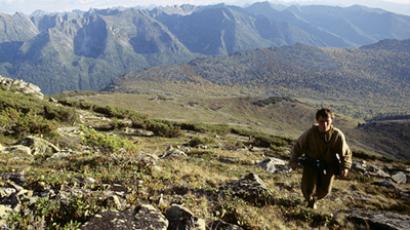With old ways forgotten, indigenous communities turn desperate
Khabarovsk Region, in the country's Far East, is home to Russians, Ukrainians, Tartars and even Koreans. The area's indigenous population is adapting to a shrinking world, where cultures and people increasingly mix.
RT has been to Khabarovsk to explore how the ancient people of this land are attempting to keep their way of life alive and retain their identity in the global village.The Nanai are a native people who were in the Far East long before the first Russian explorers arrived. They still retain links to their pre-Russian culture.“Most Nanai families are happy for us to teach our native culture here at the village hall,” local teacher Lyubov Geika told RT. “There’s a relatively large population of Nanai, and that helps conserve some of the traditions.”Fishing has always been central to the Nanai way of life. When the Russians arrived, they brought new technology, and a new culture. Now, most of the 18,000 Nanai have jobs outside the fishing industry, but still take regular trips out onto the windswept ice.“Fishing is extremely important to us,” Artem Barbak, a fisherman and farmer, explains. “It’s part of our traditional way of life, too. We eat fish raw, we fry them, boil them, smoke them and dry them. We eat all sorts of fish.”But further to the East, RT found a much bleaker picture.Some villages are poignant examples of a failed meeting between an outside culture and a native people. Whereas the Nanai have accepted a large degree of assimilation but remain productive and connected to their heritage, the Orach people have lost far more than just their native ways.The Orach were also a native fishing people. Now, their fishing boats lie broken and unused on the shore.“Our parents are to blame,” security guard Olga Kostaseva tells RT. “They started the drinking. The children see it and start as well. Some children grow up too fast. They start smoking at six.”Since Soviet times, attempts to integrate the Orach into society have had disastrous results. Houses go largely unrepaired, most Orach children drop out of school early, unemployment and alcoholism are rife.Oksana’s house is falling apart and she has not stored enough food to last through the winter. She and her jobless husband want to be given a new house and free schooling. She agreed to talk to RT about her situation.RT: Why is your husband not working? Does he want work?Oksana Punadinka: He wants work but there's no jobs.RT: And in the nearby town?OP: He would need to go there every day!RT: But it's not far.OP: He would need to pay for the bus!RT: But he'll get wages.Lyudmila's house nearby is much better kept. She is the village elder and her grandfather was revered as the last grand shaman amid a world still rooted in its origins. Nowadays, the people around her are very different. Her assessment of her community is far from optimistic.“They’ve given up. They don’t want to live a normal life,” Lyudmila Bisyanka says.“We tore away their culture and implanted ours. We helped them, so they became dependent,” local ethnologist Lyubov Varshavskaya explains. “Now the social and economic situation has changed. They need to start helping themselves. But they’re not ready to do that.”













